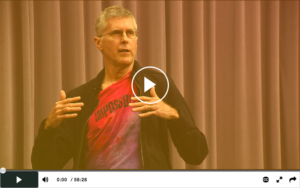Business & Money
I have a rule that I live by when it comes to looking for investment ideas. When I hear about a company/product in 3 different settings, I commit to doing a bit of digging to learn more.
One of my favorite websites to read is Stratechery. It’s all about the strategic decisions made by technology companies. Perhaps 6 months ago, I got an email from Stratechery saying they were launching advanced search capabilities on the site, powered by Elastic.
One of my favorite email newsletters is from a company called Stocktwits. It’s Twitter for people that like to follow markets. They recently launched Stocktwits advanced search, which allows you to track down the best posts and memes related to specific stock tickers. You guessed it – also powered by Elastic.
One of my favorite venture capitalists to follow is Howard Lindzon. He carries himself in a down-to-earth manner, while nonetheless finding & funding incredible seed-stage companies on the regular. And he’s incredibly bullish on Elastic (he wrote about them here)!
That makes 3!
Google was founded in the late 90s to organize the world’s information. With the exponential increase in the information at our fingertips that comes with the internet, discovery becomes paramount. Google solved that problem in a major way. Now they’re the 4th largest company in the world.
In today’s environment, every company has a similar problem. They have tons of information stored in different places and need an easy way to index and search through it all. Elastic solves that problem in a major way.
Finally, with economic uncertainty on the rise, I love searching the markets for relative strength. By relative strength, I mean that I’m looking for the companies that continue to perform well as other market leaders begin to suffer. It seems to me that companies with good relative strength are often the ones that become leaders when good times return.
This one is definitely going on the watch list!
Human Progress
I often use this section to talk about technological progress or progress concerning the ways we organize and interact with one another. But irrespective of the specific sort of progress in question, progress is, by definition, relative. You can only measure it in comparison to a previous point in time. Something is better today than it was yesterday.
Let’s take an example.
The other day I was walking Dutch beside our apartment building. The front of the building has a beautiful facade and faces the East River. Thus it would create a rather ugly picture if trash from the building was piled high in front of the place where people enter and exit. As a result, trash is instead piled on the side of the building where dumpsters come a couple times a week to take it away.
On this particular day, as Dutch and I were walking on the side of the building, from the back of the building toward the front, it was trash day. So, per usual, trash and recycling bags were piled as high as the windows of the cars parked there along the curb, perhaps 4 feet or so. As we got closer to the bags, I could see a family of people picking through the bags. This is not an uncommon sight in New York City. I believe you get a few cents per bottle/can if you bring them to waste disposal facilities. So these (what I assume to be) poor families track down as many as possible to make a few bucks.
Perhaps 10 meters ahead of Dutch and I was another woman walking her dog. She very clearly wasn’t a huge fan of the family picking through the trash. She altered her course so that she was as close as possible to the building, and thus maximized the distance between her and the “trash pickers.”
As Dutch and I passed, I wasn’t quite as concerned. They were focused on what they were doing and there was at least 5 feet or so of distance between us. I, of course, had no desire to come in to contact with trash at 7 in the morning (or any other time for that matter), but I also sort of appreciated the sight. Here was what looked like a mother and father, a grandma, and 2 kids, all focused on collecting as many bottles as possible to maximize that day’s earnings.
To me, this is the quintessential image of progress; the definition of hustle. I don’t know their situation, but I imagine that those people were not passionate about trash picking. Rather, they were doing what they needed to do to get by, to ensure that the family had food on the table and that bills were paid. At the end of the day, that family had a bit more money than they started the day with (I hope).
And if you ask me, I bet those kids will be just fine. I don’t know how many 7-year-olds know what it’s like to get up early in the morning to pick through trash to ensure your family gets to eat that day.
I think we all would be well served to keep the image of this family in mind when we think about our own definition of progress.
What can you do today that will make for a better tomorrow, if even only a little bit?
Philosophy
Many of you know that I love Pop-Tarts. Especially, the frosted brown sugar cinnamon ones! And I’m not sure I’ve ever read the nutritional label, but safe to say they’re terrible for you! But some things in life are just worth it!
While these things are so so good, it’s clear you can’t eat them all the time. So I limit myself to one sleeve (2 individual Pop-Tarts) per week. Rather, I don’t eat one sleeve every week, but when I do decide to eat one, the rule is that I cannot have another for 7 days. Gotta watch the waistline 😉.
During this past week, my Pop-Tart craving hit me hard on Wednesday. And, as one does, I gave in to it (unfortunately, I was forced to resort to frosted strawberry because my main squeeze was MIA).
Then, when I finished working on Friday night, it hit me again as I was shutting down my computer around 9:30 pm. And the timing was inopportune because I needed to walk Dutch. Our normal route takes us past a Duane Reade with every flavor of Pop-Tart imaginable. So I decided to leave my wallet and phone at home (no cash, credits cards, or Apple Pay with which to make a purchase).
I left everything at home for the same reason that we do not buy boxes of Pop-Tarts to store at home. I don’t trust myself.
None of us has a bottomless well of discipline and motivation, myself included. We’re human. Our desires and emotions overpower rational thought on a daily basis. It happens like clockwork and it’s perfectly predictable.
So, for me, the way to hack the system is to remove opportunities to cheat. If I have no way to pay, I can’t buy Pop-Tarts.
It’s the same reason that, whenever I have hunted for apartments in the past, the number 1 prerequisite is a good gym in the building. If I don’t have to leave the building, there’s never an excuse not to go.
It’s why my phone is always face down on my desk and on silent. If I cannot hear the notifications or see them pop up, there’s no chance of distraction.
Long story short, it seems to me that the shortest route to discipline is making it easy to remain focused on whatever it is you’re trying to accomplish. Make it hard to cheat.
But at the same time, be compassionate with yourself every now and again. Someone has to eat those Pop-Tarts!
My Latest Discovery
On Wednesday, I enjoyed one of the most, perhaps THE most, tender cuts of beef tenderloin on the planet! It was a part of the “beef tenderloin stir fry” dish at Llama Inn.

Yes, your eyes do not deceive! The beef tenderloin is covered with french fries and a cream pepper drizzle.
I wouldn’t generally describe steak with the phrase “melt in your mouth,” but it’s apropos in this case. It’s almost as if it wasn’t beef at all. Magnificent!



